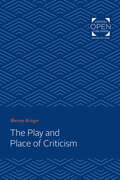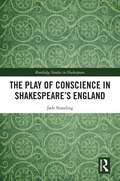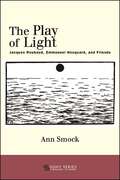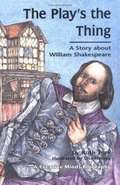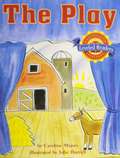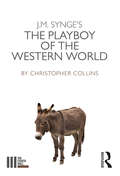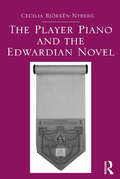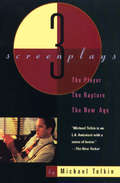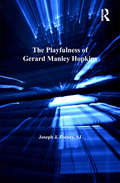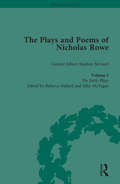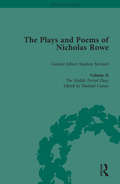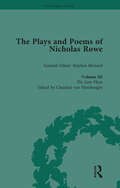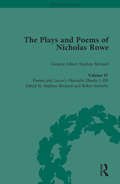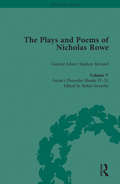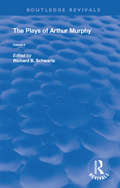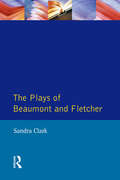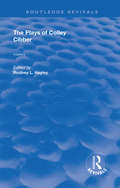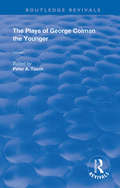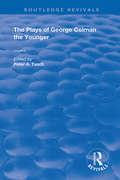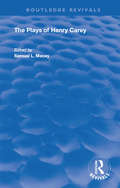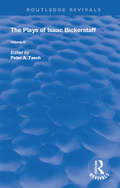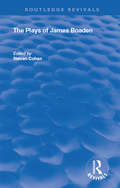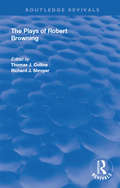- Table View
- List View
The Play and Place of Criticism
by Murray KriegerOriginally published in 1967. In The Play and Place of Criticism, Professor Krieger addresses basic questions related to criticism in the title essay that forms the introduction to this collection and that constitutes a considered statement of his "contextualist" position. In agreement with Spitzer, Krieger believes that the critic has a valuable part to play in relating the "new words" of the individual poem to the "old words" of the language. He goes further in identifying the role of the critic as essentially rhapsodic, a sharing-in and an expression of the poet's "fine frenzy," which, when it succeeds, transports the critic beyond words and dooms his analytical efforts to failure. Thus, while defending the critic's right to exercise "the free play of the mind" in approaching his subject, the author insists that the critic recognize his subordinate "place" in performing his act of mediation. Elsewhere in the volume Krieger uses other terms and metaphors to explore similar problems revolving around the mediate and the immediate in poetry and criticism. In calling for a poetry of "still movement," for example, he examines both the opposition and the union of temporal with spatial or plastically formal elements, of the dynamically empirical with the statically archetypal. Having defined his critical position in these ways, Krieger relates it to other schools of criticism and applies its methods to the analysis of works by Shakespeare, Pope, Arnold, Hawthorne, and others.
The Play of Conscience in Shakespeare’s England (Routledge Studies in Shakespeare)
by Jade StandingHaving a conscience distinguishes humans from the most advanced AI systems. Acting in good conscience, consulting one’s conscience, and being conscience-wracked are all aspects of human intelligence that involve reckoning (deriving general laws from particular inputs and vice versa), and judgement (contemplating the relationship of the reckoning system to the world). While AI developers have mastered reckoning, they are still working towards the creation of judgement. This book sheds light on the reckoning and judgement of conscience by demonstrating how these concepts are explored in Everyman, Doctor Faustus, The Merchant of Venice, and Hamlet. Academic, student, or general-interest readers discover the complexity and multiplicity of the early modern concept of conscience, which is informed by the scholastic intellectual tradition, juridical procedures of the court of Chancery, the practical advice of Protestant casuistry, and Reformation theology. The aims are to examine the rubrics for thinking through, regulating, and judging actions that define the various consciences of Shakespeare’s day, to use these rubrics to interpret questions of truth and action in early modern plays, and to offer insights into what it is about conscience that developers want to grasp to eliminate the difference between human and non-human intelligences, and achieve true AI.
The Play of Light: Jacques Roubaud, Emmanuel Hocquard, and Friends (SUNY series, Literature . . . in Theory)
by Ann SmockDrawing from five contemporary French poets—Jacques Roubaud, Emmanuel Hocquard, Danielle Collobert, Anne Portugal, and Jacques Jouet—Ann Smock juxtaposes them and provides a milieu suitable for philosophical reflection on identity, on not-being and being, on communication, and on secrets. Smock also includes thinkers such as Ludwig Wittgenstein and Giorgio Agamben, who contribute to the conversation, as do Jean-Luc Nancy and Maurice Blanchot. Though the poems considered here are often thought difficult, Smock maintains a light touch throughout. She writes in an accessible, even pleasurable style while contributing to the scholarly study of literature at the border shared by poetry and philosophy
The Play of Words: Fun and Games for Language Lovers
by Richard LedererDo you know the connection between the expression A HARROWING EXPERIENCE and agriculture, between BY AND LARGE and sailing, between GET YOUR GOAT and horses, or between STEAL YOUR THUNDER and show business? You probably have heard the comparisons HAPPY AS A CLAM, SMART AS A WHIP, PLEASED AS PUNCH, DEAD AS A DOORNAIL - but have you ever wondered why a clam should be happy, a whip smart, punch pleased, and a doornail dead? By playing the fifty games in this book, you'll discover the answers to these questions as well as hundreds of other semantic delights that repose in our marvelous English language.
The Play's the Thing: A Story about William Shakespeare
by Ruth TurkTraces the life of the famous English writer, from his childhood and schooling in Stratford-upon-Avon, through his successful career as actor and playwright in London, to his death in 1616.
The Play, on Level Level 2.6.2: Houghton Mifflin Reading Leveled Readers
by Caroline Majors Julie DurrellLeveled Reader, Grade 2.
The Playboy of the Western World (The Fourth Wall)
by Christopher Collins‘I’m thinking this night wasn’t I a foolish fellow not to kill my father in years gone by.’ – Christy Mahon On the first night of J. M. Synge’s The Playboy of the Western World (1907) the audience began protesting in the theatre; by the third night the protests had spilled onto the streets of Dublin. How did one play provoke this? Christopher Collins addresses The Playboy ’s satirical treatment of illusion and realism in light of Ireland’s struggle for independence, as well as Synge’s struggle for artistic expression. By exploring Synge’s unpublished diaries, drafts and notebooks, he seeks to understand how and why the play came to be. This volume invites the reader behind the scenes of this inflammatory play and its first performances, to understand how and why Synge risked everything in the name of art.
The Player Piano and the Edwardian Novel
by Cecilia Bjorken-NybergIn her study of music-making in the Edwardian novel, Cecilia Bjorkén-Nyberg argues that the invention and development of the player piano had a significant effect on the perception, performance and appreciation of music during the period. In contrast to existing devices for producing music mechanically such as the phonograph and gramophone, the player piano granted its operator freedom of individual expression by permitting the performer to modify the tempo. Because the traditional piano was the undisputed altar of domestic and highly gendered music-making, Bjorkén-Nyberg suggests, the potential for intervention by the mechanical piano's operator had a subversive effect on traditional notions about the status of the musical work itself and about the people who were variously defined by their relationship to it. <P><P> She examines works by Dorothy Richardson, E.M. Forster, Henry Handel Richardson, Max Beerbohm and Compton Mackenzie, among others, contending that Edwardian fiction with music as a subject undermined the prevalent antithesis, expressed in contemporary music literature, between a nineteenth-century conception of music as a means of transcendence and the increasing mechanisation of music as represented by the player piano. Her timely survey of the player piano in the context of Edwardian commercial and technical discourse draws on a rich array of archival materials to shed new light on the historically conditioned activity of music-making in early twentieth-century fiction.
The Player, The Rapture, The New Age: Three Screenplays (Books That Changed the World)
by Michael TolkinThree film scripts, including an Academy Award nominee, from the man described as an “Antonioni with a sense of humor” (The New Yorker). From his earliest works to the Emmy-nominated Showtime limited series Escape at Dannemora, Michael Tolkin is known as one of the industry’s biggest talents—and sharpest satirists. This volume contains three of his acclaimed screenplays. The Player, about the twisted world of Hollywood, was directed by Robert Altman and starred Tim Robbins and Greta Scacchi. It won an Edgar Award for Best Motion Picture Screenplay and has been hailed as “one of the smartest, funniest, most penetrating movies about moviemaking ever made” (Vanity Fair).The Rapture explores the emotionally intense, surreal world of Christian fundamentalism. The Los Angeles Times called it “a nervy, unsettling, edgy piece of work, that most audacious of cinematic ventures, a film of theological ideas, intent on looking into what we believe and why we believe it, determined, even eager, to explore the issues of heaven, hell, and the hereafter.”And The New Age tells the story of a young couple’s fall from financial grace and their quest for spirituality in a world defined by materialism.
The Playfulness of Gerard Manley Hopkins (The\nineteenth Century Ser.)
by Joseph J. FeeneyRenowned Hopkins expert Joseph J. Feeney, SJ, offers a fresh take on Gerard Manley Hopkins which shakes our understanding of his poetry and his life and points towards the next phase in Hopkins studies. While affirming the received view of Hopkins as a major poet of nature, religion, and psychology, Feeney finds a pervasive, rarely noticed playfulness by employing both the theory of play and close reading of his texts. This new Hopkins lived a playful life from childhood till death as a student who loved puns and jokes and wrote parodies, comic verse, and satires; as a Jesuit who played and organized games and had "a gift for mimicry;" and most significantly, as a poet and prose stylist who rewards readers with unexpected displays of whimsy and incongruity, even, strikingly, in "The Wreck of the Deutschland," "The Windhover," and the "Terrible Sonnets." Feeney convincingly argues that Hopkins's distinctive playfulness is inextricably bound to his sense of fun, his creativity, his style, and his competitiveness with other poets. In unexpected images, quirky metaphors, strange perspectives, puns, coinages, twisted syntax, wordmusic, and sprung rhythm, we see his playful streak burst forth to adorn those works critics consider his most brilliant. No one who absorbs this book's radical readings will ever see and hear Hopkins's poetry and prose quite the way they used to.
The Plays and Poems of Nicholas Rowe, Volume I: The Early Plays (The Pickering Masters)
by Rebecca Bullard Stephen Bernard John McTagueNicholas Rowe was the first Poet Laureate of the Georgian era. A fascinating and important yet largely overlooked figure in eighteenth-century literature, he is the ‘lost Augustan’. His plays are important both for the way they address the political and social concerns of the day and for reflecting a period in which the theatre was in crisis. This edition sets out to demonstrate Rowe’s mastery of the early eighteenth century theatre, especially his providing significant roles for women, and examines the political and historical stances of his plays. It also highlights his work as a translator, which was both innovative and deeply in tune with current practices as exemplified by John Dryden and Alexander Pope. This is the first scholarly edition of all Rowe’s plays and poems and is accompanied by 15 musical scores and 31 black and white illustrations. In this first volume, a general introduction by Stephen Bernard and Michael Caines introduces Rowe's works and the five volumes that comprise this set. It then presents the early plays, The Ambitious Step-Mother, Tamerlane, and The Fair Penitent along with a newly written explanatory introduction by Rebecca Bullard and John McTague which precedes the full edited text. Appendices covering dedications performance history, the related music and textual apparatus are also included. A consolidated bibliography is included with the final volume for ease of reference.
The Plays and Poems of Nicholas Rowe, Volume II: The Middle Period Plays (The Pickering Masters)
by Michael CainesNicholas Rowe was the first Poet Laureate of the Georgian era. A fascinating and important yet largely overlooked figure in eighteenth-century literature, he is the ‘lost Augustan’. His plays are important both for the way they address the political and social concerns of the day and for reflecting a period in which the theatre was in crisis. This edition sets out to demonstrate Rowe’s mastery of the early eighteenth century theatre, especially his providing significant roles for women, and examines the political and historical stances of his plays. It also highlights his work as a translator, which was both innovative and deeply in tune with current practices as exemplified by John Dryden and Alexander Pope. This is the first scholarly edition of all Rowe’s plays and poems and is accompanied by 15 musical scores and 31 black and white illustrations. In this second volume the middle plays, The Biter, Ulysses, and The Royal Convert are presented, along with a newly written explanatory introduction by Michael Caines which precedes the full edited text. Appendices covering dedications, prologues and epilogues, performance history, the related music and textual apparatus are also included. A consolidated bibliography is included with the final volume for ease of reference.
The Plays and Poems of Nicholas Rowe, Volume III: The Late Plays (The Pickering Masters)
by Stephen Bernard Claudine Van HensbergenNicholas Rowe was the first Poet Laureate of the Georgian era. A fascinating and important yet largely overlooked figure in eighteenth-century literature, he is the ‘lost Augustan’. His plays are important both for the way they address the political and social concerns of the day and for reflecting a period in which the theatre was in crisis. This edition sets out to demonstrate Rowe’s mastery of the early eighteenth century theatre, especially his providing significant roles for women, and examines the political and historical stances of his plays. It also highlights his work as a translator, which was both innovative and deeply in tune with current practices as exemplified by John Dryden and Alexander Pope. This is the first scholarly edition of all Rowe’s plays and poems and is accompanied by 15 musical scores and 31 black and white illustrations. In this third volume the late plays, The Tragedy of Jane Shore and The Tragedy of the Lady Jane Grey are presented, along with a newly written explanatory introduction by Claudine van Hensbergen which precedes the full edited text. Appendices covering performance history, the related music and textual apparatus are also included. A consolidated bibliography is included with the final volume for ease of reference.
The Plays and Poems of Nicholas Rowe, Volume IV: Poems and Lucan’s Pharsalia (Books I-III) (The Pickering Masters)
by Robin Sowerby Stephen BernardNicholas Rowe was the first Poet Laureate of the Georgian era. A fascinating and important yet largely overlooked figure in eighteenth-century literature, he is the ‘lost Augustan’. His plays are important both for the way they address the political and social concerns of the day and for reflecting a period in which the theatre was in crisis. This edition sets out to demonstrate Rowe’s mastery of the early eighteenth century theatre, especially his providing significant roles for women, and examines the political and historical stances of his plays. It also highlights his work as a translator, which was both innovative and deeply in tune with current practices as exemplified by John Dryden and Alexander Pope. This is the first scholarly edition of all Rowe’s plays and poems and is accompanied by 15 musical scores and 31 black and white illustrations. In this fourth volume his poetry and the first part of his translation of Lucan's Pharsalia, described by Samuel Johnson as one of the greatest productions in English poetry, is presented. A newly written explanatory introduction by Stephen Bernard to the poems, and by Robin Sowerby to the Pharsalia, precedes each of full edited texts. The second part of the text and textual apparatus are included with the fifth volume of this edition. A consolidated bibliography is also included with the final volume for ease of reference.
The Plays and Poems of Nicholas Rowe, Volume V: Lucan’s Pharsalia (Books IV-X) (The Pickering Masters)
by Lucan’s PharsaliaNicholas Rowe was the first Poet Laureate of the Georgian era. A fascinating and important yet largely overlooked figure in eighteenth-century literature, he is the ‘lost Augustan’. His plays are important both for the way they address the political and social concerns of the day and for reflecting a period in which the theatre was in crisis. This edition sets out to demonstrate Rowe’s mastery of the early eighteenth century theatre, especially his providing significant roles for women, and examines the political and historical stances of his plays. It also highlights his work as a translator, which was both innovative and deeply in tune with current practices as exemplified by John Dryden and Alexander Pope. This is the first scholarly edition of all Rowe’s plays and poems and is accompanied by 15 musical scores and 31 black and white illustrations. In this final volume the second part of his translation of Lucan’s Pharsalia, described by Samuel Johnson as one of the greatest productions in English poetry, is presented along with some his own original poetry. A newly written explanatory introduction to the Pharsalia by Stephen Bernard precedes the full edited text in volume IV. Appendices covering the related music and textual apparatus are also included. The edition comes with a consolidated bibliography for ease of reference.
The Plays of Arthur Murphy: Volume II (Routledge Revivals)
by Richard B. SchwartzOriginally compiled and published in 1979, this volume contains six plays of Arthur Murphy: The Apprentice; The Upholsterer; The Old Maid; The Citizen; No One's Enemy but His Own; Three Weeks After Marriage.
The Plays of Beaumont and Fletcher
by Sandra ClarkThis is an analysis of sexual themes in the plays of Beaumont and Fletcher, both in the context of the Jacobean theatre and in the light of modern readings of sexuality and gender during the English Renaissance. Sandra Clark challenges commonly-held perceptions of Beaumont and Fletcher's work. The book is intended for undergraduate and graduate courses on Renaissance literature, Elizabethan and Jacobean drama, tragicomedy, gender and genre in the Renaissance.
The Plays of Colley Cibber: Volume II (Routledge Revivals)
by Rodney L. HayleyOriginally collated and published in 1980, this volume contains the plays of Colley Cibber, edited and with an introduction by Rodney L. Hayley. The book contains The Lady's Last Stake, The Rival Fools, Ximena, The Non-Juror and The Refusal.
The Plays of Eugene O'Neill: A New Assessment
by Virginia FloydVirginia Floyd draws on her extensive knowledge of the playwright Eugene O'Neill's work and of his notebooks at Yale University to examine the composition and significance of all the plays, including those unpublished. In chronological order she deals with the significance of each play, assessing its autobiographical as well as literary aspects.
The Plays of George Colman the Younger: Volume 1 (Routledge Revivals)
by George ColmanOriginally composed and published in 1981, this second book makes up two volumes of the plays of George Colman the Younger. Versatile, industrious, talented, Goerge Colman the Younger (1762-1836) followed Sheridan as England's most popular playwright. He wrote not only monologues, farces, pantomimes, comic operas, and straight comedies, but also hybrid three-act anticipations of melodrama.
The Plays of George Colman the Younger: Volume 2 (Routledge Revivals)
by George ColmanOriginally composed and published in 1981, this second book makes up two volumes of the plays of George Colman the Younger. Versatile, industrious, talented, George Colman the Younger (1762-1836) followed Sheridan as England's most popular playwright. He wrote not only monologues, farces, pantomimes, comic operas, and straight comedies, but also hybrid three-act anticipations of melodrama.
The Plays of Henry Carey (Routledge Revivals)
by Samuel L. MaceyOriginally written between the years 1722 and 1743, the works of Henry Carey included in this volume were originally compiled by Samuel L. Macey for this volume in 1980. The volume includes the dramatic works of Henry Carey, Hanging and Marriage; or the Dead-Man's Wedding, and the songs, as they are sung in "Betty, or the Country-Bumpkins". They are all included here edited and with an introduction by Samuel L. Macey, as well as alongside textual notes.
The Plays of Isaac Bickerstaff: Volume III (Routledge Revivals)
by Peter A. TaschThis compilation of Isaac Bickerstaff's plays was originally compiled and published in 1981, and the plays written in the 1760s-70s. Edited and with an introduction by Peter A. Tasch, the volume contains seven plays: The Captive; He Wou'd if He Cou'd; or, An Old Fool worse than Any; The Recruiting Serjeant; 'Tis Well it's no Worse; The Brickdust-Man and Milk-Maid; The Sultan, or A Peep into the Seraglio; and The Spoil'd Child.
The Plays of James Boaden (Routledge Revivals)
by Steven CohanOriginally compiled and published in 1980, this volume contains the plays of James Broaden. Although not many critics of eighteenth-century drama mention Broaden, he loved the theatre and its world, and this love comes across in everything he wrote. This volume contains plays including the songs and chorusses of his first, Ozmynn and Daraxa, from 1793, Fountainville Forest, from 1794, and The Secret Tribunal, from 1795, as well as many others.
The Plays of Robert Browning (Routledge Revivals #No. 14)
by Thomas J. Collins Richard J. ShroyerPublished in 1988, and including all seven of Robert Browning’s dramas, Collins and Shroyer introduce this convenient and reliable reading text by discussing the plays with a history of criticism and giving insightful notes on each individual play in the book.
